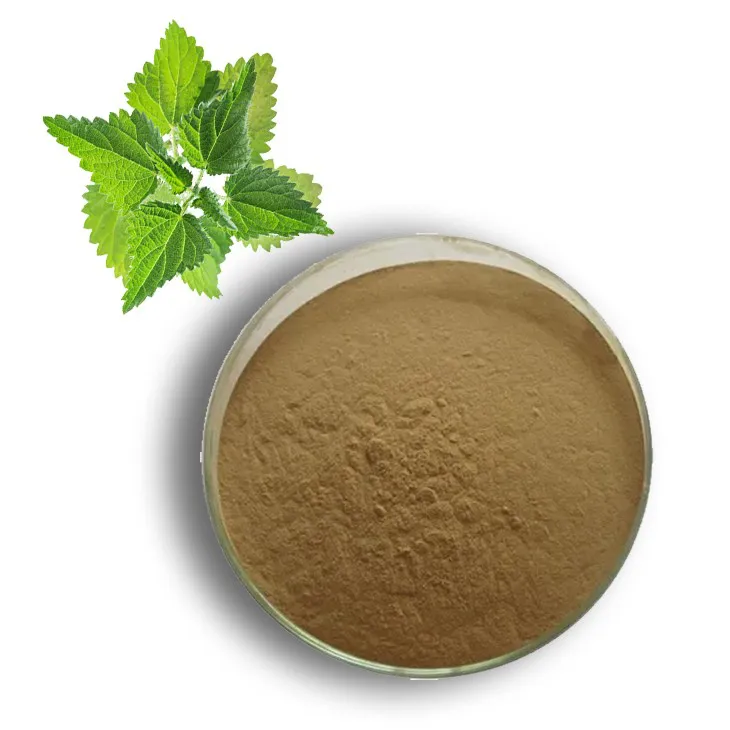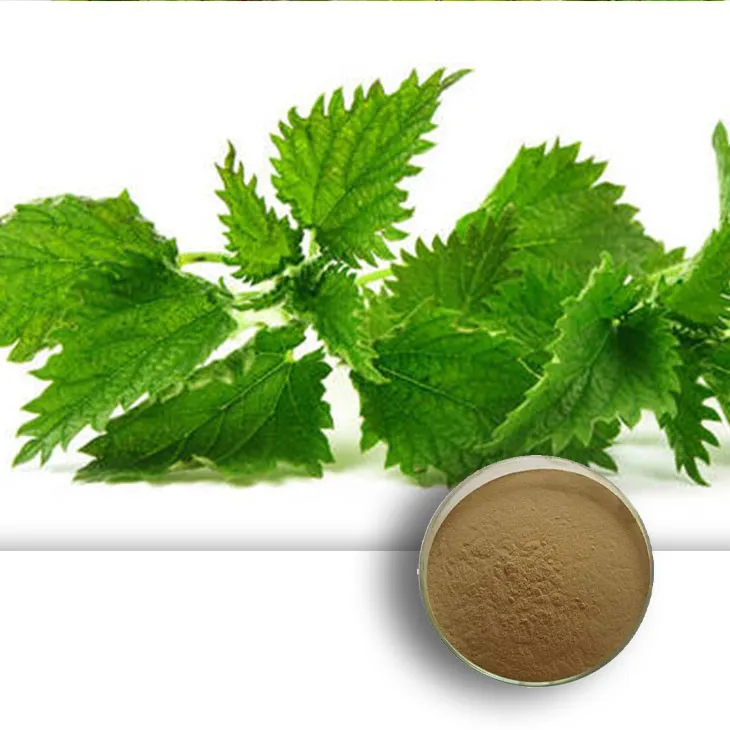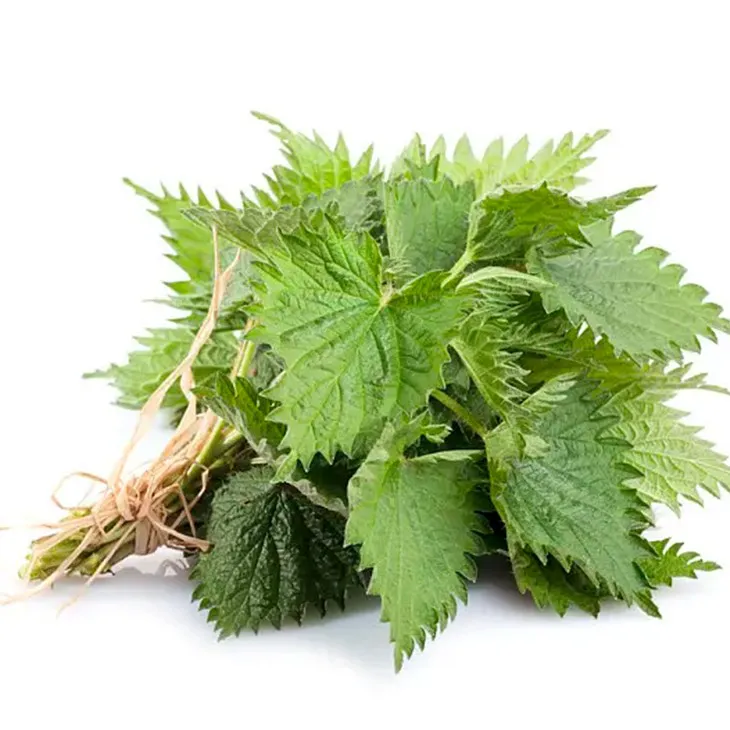- 0086-571-85302990
- sales@greenskybio.com
Nettle leaf extract can reduce high blood pressure.
2024-11-11

Introduction
High blood pressure, also known as hypertension, is a common and serious health condition that affects millions of people worldwide. It is a major risk factor for heart disease, stroke, and other cardiovascular problems. While there are many pharmaceutical drugs available for treating hypertension, there is also growing interest in natural remedies. One such remedy that has shown promise is Nettle leaf extract. Nettle leaf extract has been the subject of numerous studies in recent years, and evidence suggests that it may have a positive impact on reducing high blood pressure.

The Role of Nettle Leaf in Traditional Medicine
Nettle has a long history of use in traditional medicine. For centuries, it has been used to treat a variety of ailments, including arthritis, allergies, and urinary tract infections. In traditional herbal medicine systems, nettle was often prepared as a tea or tincture. Its use was based on the belief that it had anti - inflammatory, diuretic, and other beneficial properties. Although traditional medicine practices were not always based on scientific evidence, modern research is now starting to uncover the potential health benefits of nettle, particularly in relation to blood pressure regulation.

Components of Nettle leaf extract
Nettle leaf extract contains a variety of bioactive compounds that may contribute to its blood - pressure - lowering effects. These include:
- Polyphenols: These are antioxidant compounds that can help reduce oxidative stress in the body. Oxidative stress is associated with endothelial dysfunction, which is an important factor in the development of hypertension. By reducing oxidative stress, polyphenols in nettle leaf extract may help improve vascular endothelial function.
- Flavonoids: Flavonoids are a type of polyphenol that have been shown to have vasodilatory effects. They can relax the smooth muscle cells in blood vessels, leading to an increase in vessel diameter and a decrease in blood pressure. Nettle leaf extract is rich in flavonoids such as Quercetin and kaempferol.
- Amino acids: Nettle contains several amino acids, some of which may play a role in blood pressure regulation. For example, arginine is a precursor to nitric oxide, which is a powerful vasodilator. By increasing nitric oxide production, nettle leaf extract may help dilate blood vessels and lower blood pressure.

Mechanisms of Action in Reducing Blood Pressure
Improving Vascular Endothelial Function
The endothelium, which is the inner lining of blood vessels, plays a crucial role in blood pressure regulation. A healthy endothelium releases substances such as nitric oxide, which helps to keep blood vessels relaxed and dilated. In hypertension, endothelial function is often impaired. Nettle leaf extract may help improve endothelial function in several ways. As mentioned earlier, the polyphenols and flavonoids in the extract can reduce oxidative stress, which is a major cause of endothelial dysfunction. Additionally, some of the compounds in nettle leaf extract may stimulate the production of nitric oxide directly, leading to improved blood vessel dilation and a reduction in blood pressure.
Regulating Blood Pressure - Related Hormone Levels
Hormones also play an important role in blood pressure regulation. For example, the renin - angiotensin - aldosterone system (RAAS) is a key hormonal system involved in maintaining blood pressure. In some cases of hypertension, the RAAS may be overactive. Nettle leaf extract may have an impact on this system. Some studies suggest that nettle may inhibit the activity of renin, an enzyme that is part of the RAAS. By inhibiting renin, nettle leaf extract can potentially reduce the production of angiotensin II, a hormone that causes blood vessels to constrict and blood pressure to rise. This, in turn, can lead to a decrease in blood pressure.
Evidence from Scientific Studies
There have been several scientific studies on the effects of nettle leaf extract on blood pressure. In animal studies, nettle leaf extract has been shown to reduce blood pressure in hypertensive models. For example, one study in rats with induced hypertension found that treatment with nettle leaf extract led to a significant decrease in systolic and diastolic blood pressure over a period of weeks.
In human studies, the results have also been promising. A small - scale clinical trial involving patients with mild to moderate hypertension showed that those who took nettle leaf extract supplements for a certain period had a reduction in their blood pressure levels compared to those in the control group. However, more large - scale and long - term studies are still needed to confirm these findings and to fully understand the safety and effectiveness of nettle leaf extract in treating hypertension.
How to Use Nettle Leaf Extract for Blood Pressure Management
If you are considering using nettle leaf extract to help manage your blood pressure, there are several ways to do so:
- Nettle Leaf Tea: One of the simplest ways to consume nettle leaf extract is in the form of tea. You can make nettle leaf tea by steeping dried nettle leaves in hot water for about 10 - 15 minutes. Drink the tea 1 - 2 times a day.
- Supplements: Nettle leaf extract is also available in supplement form, such as capsules or tablets. When choosing a supplement, make sure to select a high - quality product from a reputable manufacturer. Follow the recommended dosage instructions on the product label.
- Combined with a Healthy Lifestyle: It's important to note that nettle leaf extract should not be used as a substitute for a healthy lifestyle. It should be used in combination with a balanced diet, regular exercise, and stress management. A diet rich in fruits, vegetables, whole grains, and low - fat dairy products, along with regular physical activity such as walking, jogging, or swimming, can help improve blood pressure control.
Safety Considerations
While nettle leaf extract appears to be generally safe for most people when used as directed, there are some safety considerations to keep in mind.
- Allergic Reactions: Some people may be allergic to nettle. Allergic reactions can range from mild skin rashes to more severe symptoms such as difficulty breathing. If you have a known allergy to nettle or other plants in the same family, you should avoid using nettle leaf extract.
- Interactions with Medications: Nettle leaf extract may interact with certain medications. For example, it may have an additive effect with blood - thinning medications, increasing the risk of bleeding. If you are taking any medications, especially for blood pressure or other cardiovascular conditions, it is important to consult your doctor before starting nettle leaf extract.
- Pregnancy and Breastfeeding: There is limited information on the safety of nettle leaf extract during pregnancy and breastfeeding. It is advisable for pregnant and breastfeeding women to avoid using nettle leaf extract until more research is available.
Conclusion
In conclusion, nettle leaf extract shows great potential as a natural remedy for reducing high blood pressure. Its various bioactive components, such as polyphenols, flavonoids, and amino acids, may act through multiple mechanisms to improve vascular endothelial function and regulate blood pressure - related hormone levels. While the evidence from scientific studies so far is encouraging, more research is needed to fully establish its safety and effectiveness in treating hypertension. If you are interested in using nettle leaf extract for blood pressure management, it is important to do so under the guidance of a healthcare professional. With further research, nettle leaf extract may become an important addition to the arsenal of natural therapies for hypertension.
FAQ:
1. How does nettle leaf extract reduce high blood pressure?
Netttle leaf extract reduces high blood pressure through multiple mechanisms related to the cardiovascular system. It can improve vascular endothelial function, which helps in better regulation of blood flow and pressure. Also, it plays a role in regulating the levels of hormones associated with blood pressure.
2. Is nettle leaf extract a safe option for reducing high blood pressure?
Generally, nettle leaf extract is considered relatively safe when used appropriately. However, like any supplement, it may cause side effects in some individuals. It's important to consult a healthcare provider before starting to use nettle leaf extract for blood pressure reduction, especially if you have other underlying health conditions or are taking medications.
3. How much nettle leaf extract should be taken to effectively reduce high blood pressure?
The appropriate dosage of nettle leaf extract for reducing high blood pressure has not been firmly established. It can vary depending on factors such as an individual's overall health, the severity of their high blood pressure, and other medications or supplements they may be taking. Again, it is crucial to consult a healthcare professional for personalized advice.
4. Can nettle leaf extract replace blood pressure medications?
At present, nettle leaf extract cannot replace blood pressure medications. While it shows potential in reducing blood pressure, it should be seen as a complementary approach. Blood pressure medications are often carefully calibrated based on an individual's specific health needs, and any changes to a treatment plan should be made under the guidance of a doctor.
5. Are there any side effects associated with using nettle leaf extract for high blood pressure?
Some possible side effects of nettle leaf extract include mild gastrointestinal discomfort, such as nausea or stomach upset. In rare cases, allergic reactions may occur. However, these side effects are not common and vary from person to person.
6. How long does it take for nettle leaf extract to start reducing high blood pressure?
The time it takes for nettle leaf extract to start showing an effect on reducing high blood pressure can vary. It may depend on factors like the individual's body chemistry, the dose being taken, and how consistently it is used. In some cases, it may take several weeks to months to notice a significant change in blood pressure.
Related literature
- The Effects of Nettle Leaf Extract on Cardiovascular Health"
- "Nettle Leaf Extract: A Promising Natural Remedy for Hypertension"
- "Mechanisms of Nettle Leaf Extract in Blood Pressure Regulation"
- ▶ Hesperidin
- ▶ Citrus Bioflavonoids
- ▶ Plant Extract
- ▶ lycopene
- ▶ Diosmin
- ▶ Grape seed extract
- ▶ Sea buckthorn Juice Powder
- ▶ Fruit Juice Powder
- ▶ Hops Extract
- ▶ Artichoke Extract
- ▶ Mushroom extract
- ▶ Astaxanthin
- ▶ Green Tea Extract
- ▶ Curcumin
- ▶ Horse Chestnut Extract
- ▶ Other Product
- ▶ Boswellia Serrata Extract
- ▶ Resveratrol
- ▶ Marigold Extract
- ▶ Grape Leaf Extract
- ▶ New Product
- ▶ Aminolevulinic acid
- ▶ Cranberry Extract
- ▶ Red Yeast Rice
- ▶ Red Wine Extract
-
Sugarcane Extract
2024-11-11
-
Coconut Water Powder
2024-11-11
-
Sophora Flavescens Root Extract
2024-11-11
-
Artichoke Extract
2024-11-11
-
Sea buckthorn oil
2024-11-11
-
Uridine-5'-monophosphate Disodium salt
2024-11-11
-
Polygonum Cuspidatum Extract
2024-11-11
-
Saffron Extract Powder
2024-11-11
-
Eyebright Extract
2024-11-11
-
Panax Ginseng Leaf Extract
2024-11-11





















